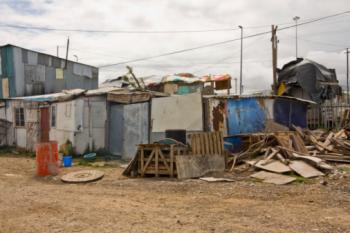Japanese Atomic Bomb Refugees
 One of the many cruelties of war in the 20th and 21st century is that thousands of people can be killed from a distance with just a press of a button or two. Whereas international conflicts of previous eras were marked by face-to-face engagements, often involving rows of soldiers standing still in orderly lines firing back and forth at one another, today, many times an target is merely a blip on a radar screen, an enemy without a face. This is assuming, of course, that one's aim is true and the enemies are just that, meaning that the dots a pilot sees before deploying a missile or other explosive could, in reality, be civilians, unlucky collateral damage of military action.
One of the many cruelties of war in the 20th and 21st century is that thousands of people can be killed from a distance with just a press of a button or two. Whereas international conflicts of previous eras were marked by face-to-face engagements, often involving rows of soldiers standing still in orderly lines firing back and forth at one another, today, many times an target is merely a blip on a radar screen, an enemy without a face. This is assuming, of course, that one's aim is true and the enemies are just that, meaning that the dots a pilot sees before deploying a missile or other explosive could, in reality, be civilians, unlucky collateral damage of military action.
The bombings of the Japanese cities of Nagasaki and Hiroshima at the hands of American bombers is one of the most debated wartime decisions in history. Though Japan rejected the terms of the Potsdam Declaration, the hundreds of thousands of innocent Japanese lives ended by the impact of the two atomic bombs and prolonged exposure to radiation leads historians to question whether or not the dropping of the Atomic bomb could really have been justified.
The total devastation of Nagasaki and Hiroshima had the potential of yielding a large number of war refugeesrapeGiven this, oddly enough, the situation of Japanese war refugees actually got worse during the occupation, as little refugee protection was afforded. Granted, those who fled or were kicked out of MacArthur's Japan are not as apt to be called "war refugees" because they did not actually depart from Japan prior to Hirohito's surrender.
Nonetheless, as the occupation was a consequence of Japanese belligerence, in effect, displaced Japanese could be considered war refugees. Moreover, displaced Japanese who had beforehand sought refugee protection and now were looking to repatriate only exacerbated the problems post-war Japan faced. With widespread food shortages and an economy in tatters, the nation could not even care for its remaining survivors, let alone refugee protection seekers.
Related Topics
- Form I-485 Application to Register Permanent Residence
- Religious and Political Opposition During WWII
- B1 Business Visa: Forms and Requirements
- What to do with an Expired Visa
- Extradition Overview
- Statistics on Country Related Deportation
- How to Use Form I-751
- Do Illegal Immigrants Hurt the Economy?
- The Guide to the National Visa Center
- Canadian Embassy